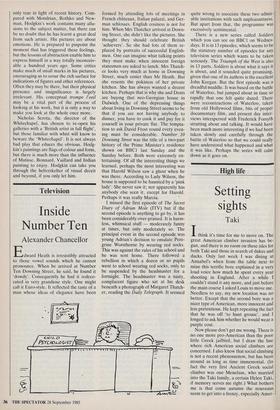Television
Inside Number Ten
Alexander Chancellor
Edward Heath is irresistibly attracted to those vowel sounds which he cannot pronounce. When he arrived at Number Ten Downing Street, he said, he found it 'dowdy'. Consequently he had it redeco- rated in very grandiose style. One might call it Euro-style. It reflected the taste of a man whose ideas of elegance have been formed by attending lots of meetings in French châteaux, Italian palazzi, and Ger- man schlosses. English cosiness is not for him. When Mrs Thatcher arrived at Down- ing Street, she didn't like the pictures. She thought they should celebrate British `achievers'. So she had lots of them re- placed by portraits of successful English- men. One can imagine what talking points they must make when innocent foreign statesmen are asked to lunch. Mrs Thatch- er looks very much at home in Downing Street, much cosier than Mr Heath. But she resents the pokiness of her private kitchen. Shc has always wanted a decent kitchen. Perhaps that is why she and Denis are buying that neo-Georgian house in Dulwich. One of the depressing things about living in Downing Street seems to be that if you are not having anybody to dinner, you have to cook it and pay for it yourself in your private flat. The tempta- tion to ask David Frost round every even- ing must be considerable. Number 10 Downing Street was the title of a two-part history of the Prime Minister's residence shown on BBC1 last Sunday and the Sunday before. Both were extremely en- tertaining. Of all the interesting things we learned, perhaps the most interesting was that Harold Wilson saw a ghost when he was there. According to Lady Wilson, the house is supposed to be haunted by a 'pink lady'. She never saw it; nor apparently has anybody else seen it, except for Harold. Perhaps it was really Marcia.
I missed the first episode of The Secret Diary of Adrian Mole (ITV) but if the second episode is anything to go by, it has been considerably over-praised. It is harm- less, whimsical stuff — moderately funny at times, but only moderately so. The principal event in the second episode was young Adrian's decision to emulate Pere- grine Worsthorne by wearing red socks. This was against the rules of his school and he was sent home. There followed a rebellion in which a dozen or so pupils went to school wearing red socks, only to be suspended by the headmaster for a fortnight. The headmaster was a nasty, complacent figure who sat at his desk beneath a photograph of Margaret Thatch- er, reading the Daily Telegraph. It seemed
quite wrong to associate these two admir- able institutions with such unpleasantness. But apart from that, the programme was excessively sentimental.
There is a new series called Soldiers which you can see on BBC1 on Wednes- days. It is in 13 episodes, which seems to be the statutory number of episodes for any television series which wants to be taken seriously. The Triumph of the West is also in 13 parts. Soldiers is about what it says it is about, and it sounded quite promising, given that one of its authors is the excellent John Keegan. But the first episode was a dreadful muddle. It was based on the battle of Waterloo, but jumped about in time so rapidly that one felt quite dazed. There were reconstructions of Waterloo, taken from old Hollywood films, bits of proper documentary film, and present day inter- views interspersed with Frederick Forsyth strutting about and talking. It would have been much more interesting if we had been taken slowly and carefully through the battle of Waterloo so that we could really have understood what happened and what it was like. Perhaps the series will calm down as it goes on.














































 Previous page
Previous page